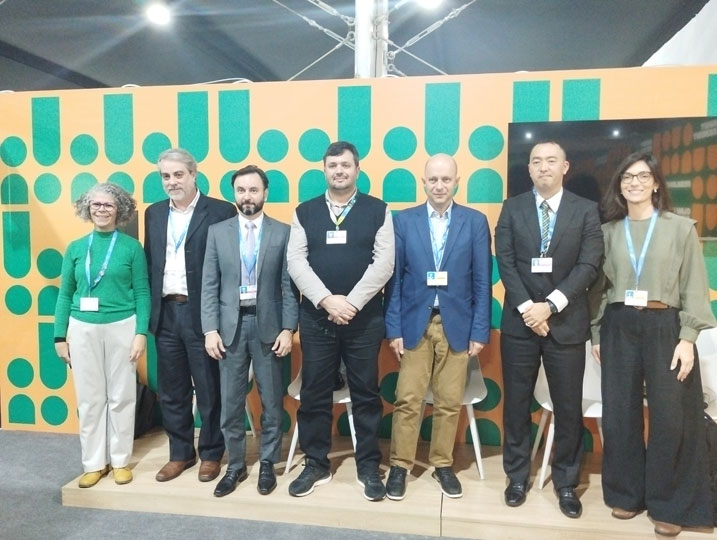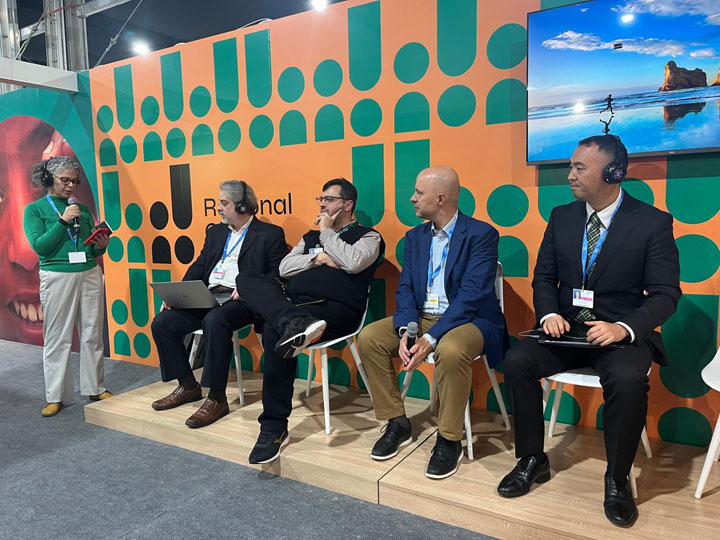【COP29 Side-Event】Financing a Green Future: Strategies to Restore Degraded Pastures
Day:2024.12.23
event |
-
Reporting party
| identity |
belong to |
title |
| Ryo Hibiya |
Environmental Management and Climate Change Group, Global Environment Department |
Technical Advisor |
Event Summary
Date: 11/21/2024
Organized by Regional Climate Foundations (RCF)
Name of venue (pavilion name): RCF Pavilion
Speaker
| identity |
belong to |
title |
| Bruno Brasil |
Ministry of Agriculture |
Director of the Department of Sustainable Production and Irrigation |
| Pedro Cunto |
Ministry of Agriculture |
Special Advisor to the Minister of Agriculture and Livestock |
| Marcelo Morandi |
Brazilian Agricultural Research Corporation |
Heads at the International Relations Office |
| Rodrigo Lima |
Agroícone |
Managing Partner |
| Yukichi Usui |
JICA |
Director, Environmental Management and Climate Change Group, Global Environment Department |
Background and purpose
The event focuses on Brazil's national program to transform degraded pastures into sustainable agroforestry systems, and has discussion on whether investments in restoring degraded pastures can have positive effects, such as food security and GHG emissions reduction, and investment models that contribute to both environmental and sustainability and economic development.
Contents
- In his opening remarks, Mr. Brasil of MAPA introduced the ABC+ Program being implemented in Brazil (2021-2030). This program is a national strategy to realize low-carbon agriculture, and is the core of the country's efforts to achieve NDC. He also noted that 60% of the country's pasturelands are in a state of disrepair and degradation, and that the PNCPD (National Program for the Conversion of Disastrous Pastures to Sustainable Agroforestry Production Systems) aims to convert 80 million ha of degraded pastures in the country (26 million ha of which are considered especially suitable for agriculture) into agricultural land. He stressed the importance of private investment as well as government investment.
- Mr. Cunto of MAPA began the panel discussion by introducing the PNCPD, pointing out that although there are already technologies for converting degraded pastures to agricultural land due to the progress of research, the current lack of social commitment, manpower, and preferential financing policies for farmers are preventing their rapid implementation. However, the current lack of social commitment, manpower, and preferential financing policies for farmers are preventing their rapid realization.
- Mr. Morandi of Brazilian Agricultural Research Corporation (EMBRAPA) explained how the savanna areas (Cerrado) that have been converted to arable land through research and development since the 1970s have faced challenges in maintaining their productivity over the long term after conversion. He stressed the importance of international cooperation in terms of promoting global sharing of scientific knowledge, in addition to funding for research and development.
- Lima of Agroícone noted that a total of nine workshops were held this year in partnership with the Ministry of Agriculture and the Institute for Climate and Social Studies (iCS), involving some 400 managers and technicians from the federal, state, and private sectors, to list areas of degraded pasture land that could be converted to agricultural land. He stated that in order to attract international investment, it is important to disclose detailed information on degraded rangelands and economic plans for farmland conversion.
- Usui of JICA, presented the vision that grain production through low-carbon agriculture on improved degraded pastureland in Brazil would not only contribute significantly to global food security and climate change countermeasures, but also to energy security in the region through biofuel production, realization of a circular rural economy, and social inclusion.


scroll